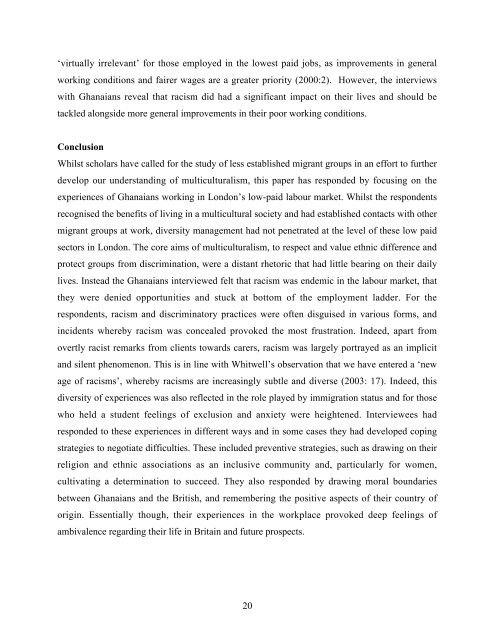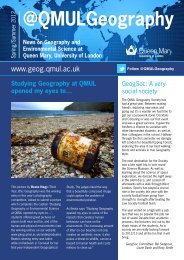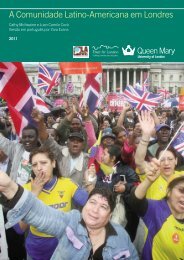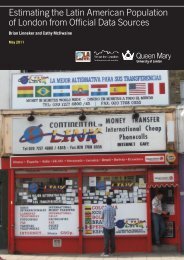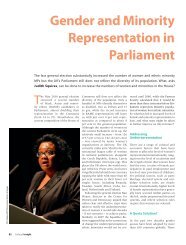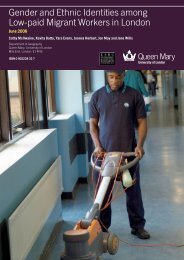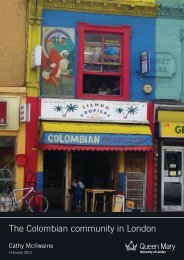Multiculturalism at work: The experiences of Ghanaians in London
Multiculturalism at work: The experiences of Ghanaians in London
Multiculturalism at work: The experiences of Ghanaians in London
- No tags were found...
You also want an ePaper? Increase the reach of your titles
YUMPU automatically turns print PDFs into web optimized ePapers that Google loves.
‘virtually irrelevant’ for those employed <strong>in</strong> the lowest paid jobs, as improvements <strong>in</strong> general<strong>work</strong><strong>in</strong>g conditions and fairer wages are a gre<strong>at</strong>er priority (2000:2). However, the <strong>in</strong>terviewswith <strong>Ghanaians</strong> reveal th<strong>at</strong> racism did had a significant impact on their lives and should betackled alongside more general improvements <strong>in</strong> their poor <strong>work</strong><strong>in</strong>g conditions.ConclusionWhilst scholars have called for the study <strong>of</strong> less established migrant groups <strong>in</strong> an effort to furtherdevelop our understand<strong>in</strong>g <strong>of</strong> multiculturalism, this paper has responded by focus<strong>in</strong>g on the<strong>experiences</strong> <strong>of</strong> <strong>Ghanaians</strong> <strong>work</strong><strong>in</strong>g <strong>in</strong> <strong>London</strong>’s low-paid labour market. Whilst the respondentsrecognised the benefits <strong>of</strong> liv<strong>in</strong>g <strong>in</strong> a multicultural society and had established contacts with othermigrant groups <strong>at</strong> <strong>work</strong>, diversity management had not penetr<strong>at</strong>ed <strong>at</strong> the level <strong>of</strong> these low paidsectors <strong>in</strong> <strong>London</strong>. <strong>The</strong> core aims <strong>of</strong> multiculturalism, to respect and value ethnic difference andprotect groups from discrim<strong>in</strong><strong>at</strong>ion, were a distant rhetoric th<strong>at</strong> had little bear<strong>in</strong>g on their dailylives. Instead the <strong>Ghanaians</strong> <strong>in</strong>terviewed felt th<strong>at</strong> racism was endemic <strong>in</strong> the labour market, th<strong>at</strong>they were denied opportunities and stuck <strong>at</strong> bottom <strong>of</strong> the employment ladder. For therespondents, racism and discrim<strong>in</strong><strong>at</strong>ory practices were <strong>of</strong>ten disguised <strong>in</strong> various forms, and<strong>in</strong>cidents whereby racism was concealed provoked the most frustr<strong>at</strong>ion. Indeed, apart fromovertly racist remarks from clients towards carers, racism was largely portrayed as an implicitand silent phenomenon. This is <strong>in</strong> l<strong>in</strong>e with Whitwell’s observ<strong>at</strong>ion th<strong>at</strong> we have entered a ‘newage <strong>of</strong> racisms’, whereby racisms are <strong>in</strong>creas<strong>in</strong>gly subtle and diverse (2003: 17). Indeed, thisdiversity <strong>of</strong> <strong>experiences</strong> was also reflected <strong>in</strong> the role played by immigr<strong>at</strong>ion st<strong>at</strong>us and for thosewho held a student feel<strong>in</strong>gs <strong>of</strong> exclusion and anxiety were heightened. Interviewees hadresponded to these <strong>experiences</strong> <strong>in</strong> different ways and <strong>in</strong> some cases they had developed cop<strong>in</strong>gstr<strong>at</strong>egies to negoti<strong>at</strong>e difficulties. <strong>The</strong>se <strong>in</strong>cluded preventive str<strong>at</strong>egies, such as draw<strong>in</strong>g on theirreligion and ethnic associ<strong>at</strong>ions as an <strong>in</strong>clusive community and, particularly for women,cultiv<strong>at</strong><strong>in</strong>g a determ<strong>in</strong><strong>at</strong>ion to succeed. <strong>The</strong>y also responded by draw<strong>in</strong>g moral boundariesbetween <strong>Ghanaians</strong> and the British, and remember<strong>in</strong>g the positive aspects <strong>of</strong> their country <strong>of</strong>orig<strong>in</strong>. Essentially though, their <strong>experiences</strong> <strong>in</strong> the <strong>work</strong>place provoked deep feel<strong>in</strong>gs <strong>of</strong>ambivalence regard<strong>in</strong>g their life <strong>in</strong> Brita<strong>in</strong> and future prospects.20


